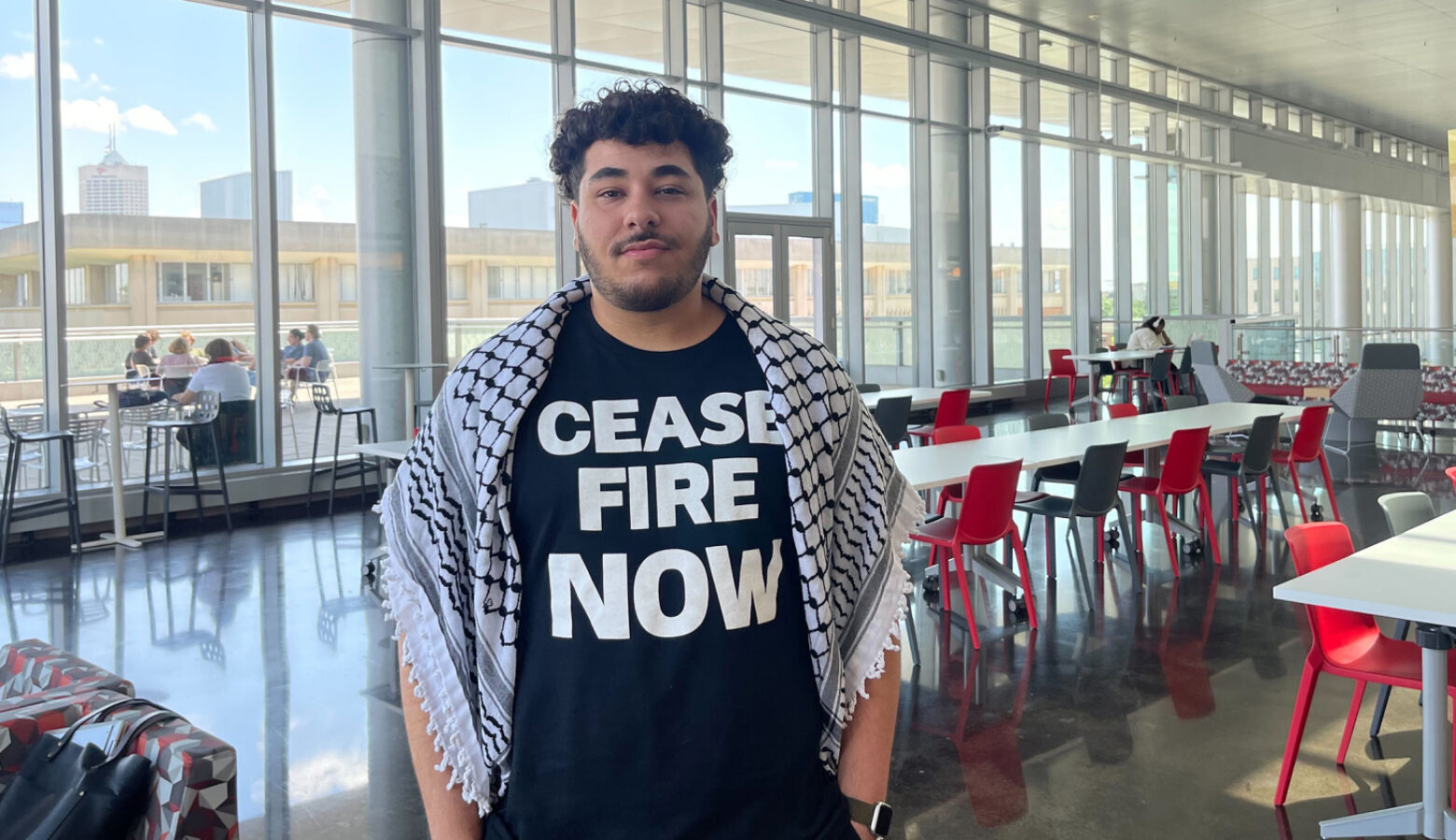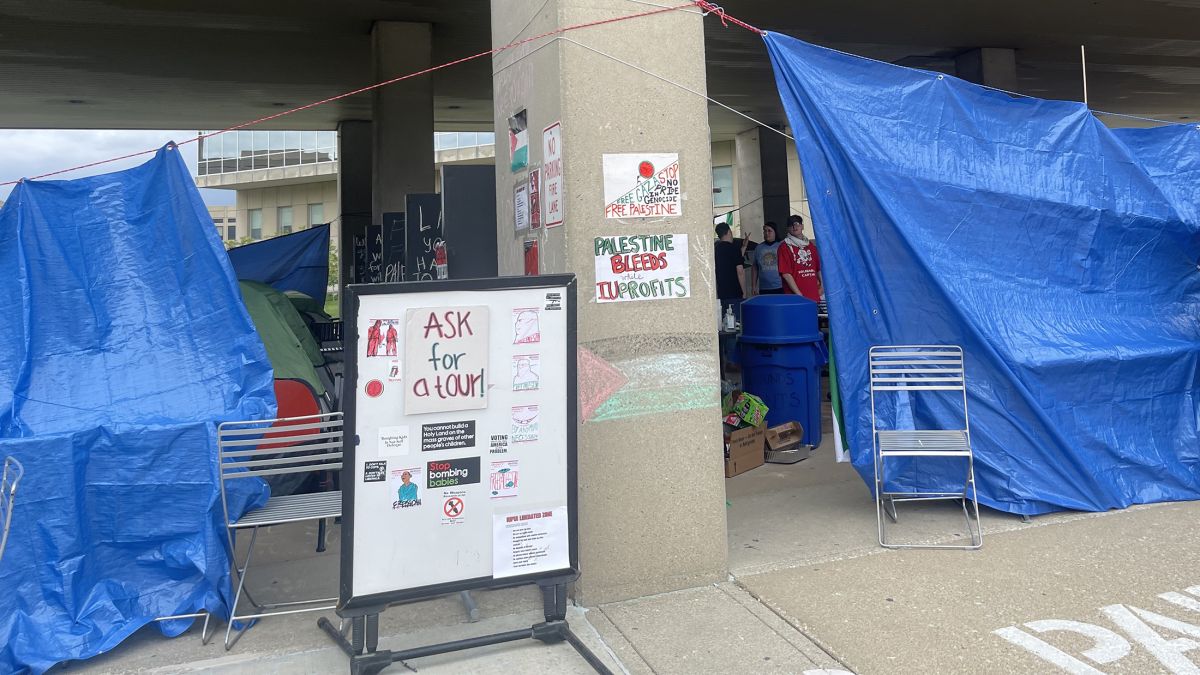Muslim college students face heavy emotional toll, discrimination as war in Gaza drags on

Yaqoub Saadeh graduated this month from Indiana University Indianapolis with a degree in psychology and a certificate in social work. But instead of celebrating the accomplishment with family and friends, he spent the last weeks of his undergrad in an encampment setup on a concrete corner of the campus.
“I just feel like, how can I function normally and do everything normally when my home country is undergoing these atrocities?” Saadeh said.
Tents went up in late April as part of the national anti-war movement on college campuses in solidarity with Palestine. The encampments come seven months after the war in Gaza began. Now, students and community members are asking their universities to divest from companies that partner with or support Israel.
While the Indianapolis demonstration remains quiet, large-scale arrests and violence at other campuses pushed the movement into a volatile national debate. But for Saadeh, the decision to protest is far more personal.
He was born and raised in Fishers, Indiana, but his family is from Palestine. Saadeh grew up advocating for Palestinian freedom, because both his grandmother and father were displaced from the conflict in Gaza during the 1967 Middle East war.
“They did not come to America with the American dream in mind,” Saadeh said. “It was displacement. They couldn’t live in their country. They had to come here to survive, and I was born into that.”
Saadeh grew up with his family’s stance that Israel’s occupation of Gaza causes human rights abuses of Palestinans. Saadeh always felt concern for his parent’s home country but it became overwhelming in the past months as he’s seen what he calls “the most widely broadcast genocide in history.”
He says the suffering of Palestinians is not new. When he visited the West Bank last summer, he said he met a family who had no clean water because their water tank was shot with bullets.
“They’re not living life,” he said “So why should I be?”
In October of last year, Hamas militants launched a deadly attack on Israel. A day later Israel declared war on Hamas. The government said “no electricity, no food, no fuel” would be allowed to enter Gaza.
More than 10,000 women and children have since been killed in the Gaza Strip, according to a revised death toll released from the United Nations.
“I can’t focus on school, I can’t focus on work, I can’t focus on my day to day activities, it’s hard to focus on yourself mentally, physically, you start, you know, just dropping the ball,” Saadeh said.
Saadeh knows he should also be developing his professional goals and career “but it just almost feels dystopian to see things just go on normally.”

The Pro-Palestinian encampment on the Indiana University Indianapolis campus in May 2024. (Sydney Dauphinais / WFYI)
Last year, Saadeh started a Middle Eastern Student Association because he wanted to promote diversity on campus. This year, the focus has shifted to advocating for and raising money for Palestine.
In the past, he’d experienced racism from students and faculty, and it’s only become more overt in recent months, he said
Federal politicians, cable news pundits and others have broadly characterized those involved in the campus protests as supporting terrorist groups.
“I’ve been called a terrorist before,” Saadeh said. “People have said, I’m a terrorist sympathizer. People say that I don’t stand for what’s right, because I’m a Palestinian. It’s all just these little, some people consider microaggressions. I just think it’s blatant racism and discrimination.”
Saadeh says although the hateful comments make him angry, they are in part why he remains in public and tables with the student association on campus. Earlier this month he and a friend visited a handful of college campuses on the East Coast to support students at other encampments.
They visited City University of New York, Columbia, MIT, Harvard and University of Michigan.
He said as someone who was a college student at the time, he wants to be able to look back and say that he was engaged in this piece of history.
“I was fighting for what I believed was right,” he said. “Regardless of the repercussions that I was facing, regardless of police brutality, regardless of the censorship, regardless of the racism, discrimination. At the end of the day, I had something that I believed in, I didn’t have much to lose and I wanted to see it for myself.”
The emotional toll
Imam Anisse Adnani understands how Saadeh and many other students feel about the war. He also knows these students face intense criticism and accusations by the media and some on their own campus for supporting Palestine. Adni works with students at Butler University as a Muslim Life Advisor.
“With the drastic increase in Islamophobia in our society, I feel a moral obligation, a sense of responsibility to be there for these youth the way that elders were there for, for me, to help me explore what is Islam,” he said.
During Ramadan this year, Adni said Muslim students struggled, as they observed it with a fast from sun-up to sundown. He did too during those four weeks.
“I think the social spiritual, emotional toll of the genocide in Gaza has been overwhelming for many,” he said. “We’re fasting. We’re praying. We’re breaking fast with one another. But our hearts, our minds, our spirits are tied to the plight of the Palestinians. We can’t divorce ourselves from that.”
As the war continues, Adni says Palestine is at the heart of everything for him and others. As Muslim students speak out through protests and encampments in Indiana and beyond, they’ve found students of other faiths and no faith have joined them.
“I think it’s hard on everyone, individually, on their own,” he said. “But knowing that we’re not alone is helping everyone get through the day, the week, the month, the year. Whatever hardships we are facing and undergoing pales in comparison to the occupation and the genocide in Palestine.”
Adni says that despite the spike in discrimination, it hasn’t gotten in the way of him practicing his faith.
“The one thing I wish everybody understood is that this is not a religious issue. It’s an issue of liberation,” he said. “ It’s an issue of liberty. Freedom. No one deserves to be under occupation.”
Now that Saadeh is a college graduate, he’s back home in Fishers with his family and applying to social work jobs focused in child abuse and neglect. Eventually, he wants to go back to school and get his Masters degree to work with young adolescents who have war-related PTSD.
He said as the conflict in Gaza continues to unfold, he wants people to stay aware of the conflict and continue to advocate for Palestinians.
“And I hope that people still keep their focus on Gaza because the people of Gaza are literally dying every day,” he said. “It’s a race against time.”
Contact WFYI education reporter Sydney Dauphinais at [email protected].
